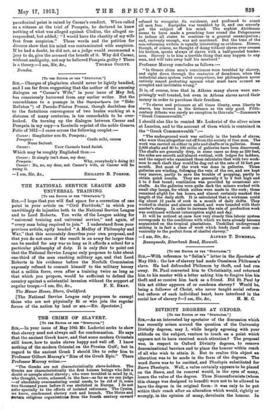THE CRIME OF SLAVERY.
[TO THE EDITOR OF THE "SPECTATOR."]
SIR,—In your issue of May 10th Mr. Ludovici seeks to show that slavery need not always call for condemnation. He says that the ancient Greek knew, and that some modern Orientals still know, how to make slaves happy and well off. I know nothing of the modern Oriental on the Persian Gulf; but in regard to the ancient Greek I should like to refer him to Professor Gilbert Murray's "Rise of the Greek Epic." There Professor Murray writes :—
"The Greeks are not characteristically slave-holders. The Greeks are characteristically the first human beings who felt a doubt or scruple about slavery ; who were troubled in mind by it, who thought, wrote, schemed, in the face—as far as we can judge —of absolutely overmastering social needs, to be rid of it, some two thousand years before it was abolished in Europe. I do not refer specially to the efforts of isolated reformers. The Cynics, we know, condemned slavery root and branch. The Stoics and Certain religions organizations from the fourth century onward refused to recognize its existence, and professed to count all men free. Euripides was troubled by it, and can scarcely get the subject off his mind. The sophist Alcidamas seems to have made a preaching tour round the Peloponnese to induce all states to combine. in a general emancipation ; and, curiously enough, was not murdered. But the tone of the non-reforming writers is equally interesting as evidence. Homer, though, of course, no thought of doing without slaves ever crosses his horizon, speaks always of slaves with a half-puzzled tender- ness. Slavery is to him a terrible thing that may happen to any man, and will take away half his manhood."
Professor Murray concludes as follows :— "In Greece alone men's consciences were troubled by slavery, and right down through the centuries of decadence, when the industrial slave system ruled everywhere, her philosophers never entirely ceased protesting against what must have semed an accepted and inevitable wrong."
It is, of course, true that in Athens many slaves were sur- prisingly well treated, but even in Athens slaves saved their money in order to purchase their freedom.
"To slaves and prisoners at all times liberty, even liberty to starve, has loomed in the distance as the only good. Fifth- century Athens was surely no exception to this rule."—Zimmern'a "Greek Commonwealth."
I should also like to remind Mr. Ludovici of the silver mines at Laurion, and to the account of them which is contained in the " Greek Commonwealth "
"The underground work was entirely in the hands of slaves, who were thus altogether cut off from the society of free men. The work was carried on either in pits and shafts or in galleries. Some 2,000 shafts and 80 to 100 miles of galleries have been discovered. The shafts are generally deep, in some cases as deep as 250 feet, the sides are smooth and:almost vertical, with ledges for ladders, and the expert who examined them calculates that with two work- men to each shaft they would be dug out at the rate of 16 feet per month. But most of the work was done in galleries. These galleries are winding, follogling the vein of the ore, and are kept very narrow, partly to save the trouble of propping, partly to obtain quick results. They are generally 2 to 3 feet high and 2 to 3 feet broad; ventilation was provided by occasional air-
shafts. As the galleries were quite dark the miners worked with small clay lamps, for which niches were made in the rock; these remained alight for ten hours, and almost certainly marked the length of the daily shift. It is calculated that a workman could dig about 12 yards of rock in a month of daily shifts. They worked in chains and almost naked, and were branded with their master's stamp. In order to increase the rate of production work was continued without interruption night and day.
It will be noticed at once how very closely this labour system corresponds to the conditions with which we have already become acquainted on the tropical plantations. Unskilled underground mining is in fact a class of work which lends itself most con- veniently to the perfect form of chattel slavery."
Runnymede, Riverbank Road, Heswall.










































 Previous page
Previous page